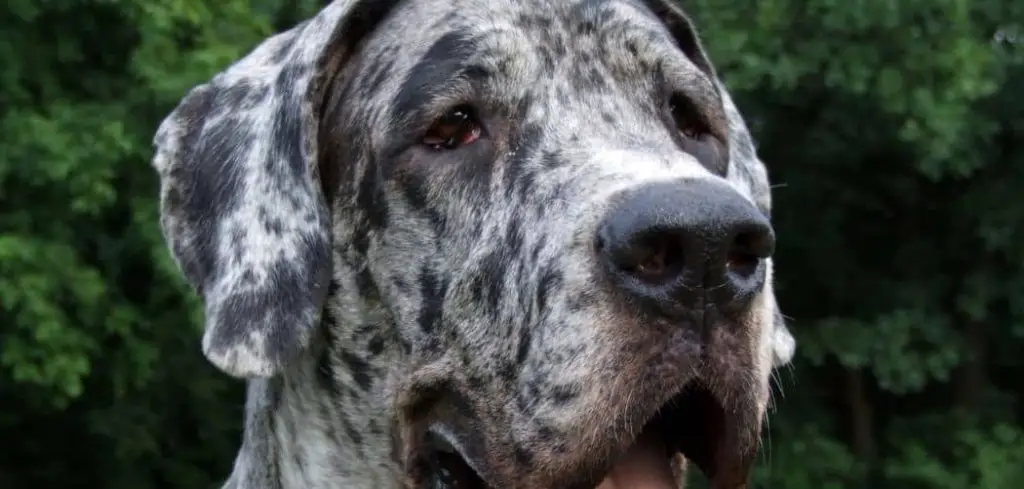An older dog coughing up blood is an alarming and often frightening situation.
Blood appearing during coughing episodes typically signals irritation or bleeding somewhere in the respiratory system—and in senior dogs, the causes can be more serious.
We outline the common reasons why an older dog may coughing up blood, what you can do, and when to seek veterinary help.
Table of Contents
Older Dog Coughing Up Blood — Why It Happens
An older dog coughing up blood usually indicates irritation, inflammation, or bleeding within the airways, throat, or lungs. Age makes dogs more vulnerable to respiratory infections, heart disease, tumors, and chronic bronchitis, all of which can cause fragile tissues to bleed.
Senior dogs often have weaker immune systems and may struggle to recover from even mild respiratory irritation. Conditions like pneumonia, collapsing trachea, clotting disorders, or lung cancer are more common with age and can lead to blood appearing during coughing episodes.
Because blood shows that tissue is damaged, this symptom always requires close monitoring and timely veterinary care.

Older Dog Coughing Up Blood: Common Causes
Chronic Bronchitis in Older Dogs
Chronic bronchitis is very common in senior dogs and causes long-term inflammation in the airway.
Over time, the coughing becomes more forceful, irritating the throat and causing small blood vessels to rupture.
Older dogs with chronic bronchitis may cough more at night, after activity, or when excited.
The condition is serious because repeated irritation can lead to further airway damage and heavier bleeding.
Read more: Dog Coughing Up White Foamy Mucus (Here’s why)
Heart Disease and Congestive Heart Failure
Heart disease is one of the leading causes of coughing in older dogs.
As the heart weakens, fluid can build up in or around the lungs, causing a persistent cough.
In advanced cases, dogs may cough up pink, frothy, or blood-tinged mucus.
You may notice fatigue, nighttime coughing, or difficulty breathing.
Heart-related coughing in older dogs is a sign that the heart can no longer keep up with the body’s needs and requires medical intervention.
Pneumonia or Severe Respiratory Infection
Older dogs are more prone to developing pneumonia due to weakened immunity.
Deep inflammation in the lungs can cause coughing that brings up blood-tinged mucus.
Senior dogs often show additional signs such as fever, rapid breathing, shivering, or lethargy.
Pneumonia interferes with oxygen exchange and can become life-threatening without treatment.
Lung Tumors or Cancer
Cancer is a major cause of coughing up blood in older dogs.
Lung tumors can be primary or metastatic (spread from another area of the body).
Coughing in these dogs often gets progressively worse over time.
You may see weight loss, decreased energy, or reluctance to exercise.
Because tumors disrupt lung tissue, even a mild cough can cause bleeding.
Foreign Body or Airway Trauma
Senior dogs may inhale grass awns, debris, or other irritants more easily if they have reduced airway sensitivity.
Foreign material can scratch, puncture, or irritate the airway, causing bleeding during coughing.
Sudden coughing fits, distress, or pawing at the face may accompany this cause.
Foreign body obstructions are emergencies because they can block airflow.
Bleeding Disorders or Medication Side Effects
Older dogs on medications like NSAIDs or steroids may be more prone to bleeding.
Bleeding disorders such as IMT, rodenticide poisoning, or low platelets can cause blood to appear during any period of inflammation.
You might also notice bruising, nosebleeds, or bleeding gums.
This is always considered an emergency in senior dogs due to their decreased resilience.
What to Do If Your Older Dog Is Coughing Up Blood
If your older dog is coughing up blood, try to keep them calm and limit movement. Activity can trigger coughing fits, leading to more irritation and bleeding.
Ensure your dog has access to fresh water, as hydration helps soothe the throat and thin mucus.
Switch from a collar to a harness immediately if your dog pulls or strains during walks. Pressure on the throat can worsen irritation, especially in senior dogs with fragile airways.
If your dog shows signs of infection—such as fever or lethargy—offer a calm environment with a humidifier or take them into a steamy bathroom to ease breathing.
Do not give cough suppressants or human medications. Many are unsafe for dogs and can mask signs of a dangerous condition.
Monitor the amount and frequency of blood. Even small amounts warrant caution in an older dog.
When to Call or Visit Your Vet
Contact your veterinarian right away if your older dog is coughing up blood.
Any amount of blood in a senior dog’s cough can indicate a serious condition, especially when paired with weakness or breathing difficulty.
Seek emergency care if your dog is breathing rapidly, seems distressed, or collapses.
If your dog has heart disease, chronic bronchitis, or a history of tumors, worsening coughing should never be ignored.
Signs such as pale gums, persistent coughing, refusal to eat, or noticeable weight loss require immediate evaluation.
Read more: Dog Coughing Up Blood and Mucus (Why it happens)
Key Takeaway
An older dog coughing up blood is always a concerning symptom that deserves quick attention and veterinary care. While some causes are manageable, others may be life-threatening without timely treatment.
Stay calm, reduce activity, and monitor your dog closely. With early intervention and proper care, many senior dogs can recover or remain comfortable despite chronic respiratory issues.
